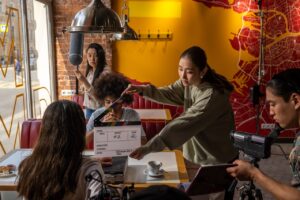
The entertainment industry in Hollywood seeks to break the barriers present in film and television, as well as in the creative work of acting, writing, directing, producing, and content, but mainly in the way the stories are told, because beyond From what we see on the screen, there is a world of people who seek to be represented and valued.
On many occasions, the Latino, Asian or Afro-descendant community is not taken into account because of the idea that it is not a good market to invest in projects that will end in economic losses, said Michael Tran, co-author of the Hollywood Diversity Report during a conference organized by Ethnic Media Services.
Studies indicate that diversity should be considered, because it generates sales and profits, however, for Tran, the entertainment industry is far from diversity, not because of economic issues but because of a lack of opportunities.
«We have seen more change in front of the camera than behind it, we saw that ethnic actors do increase, but the ones who really tell the stories, the ones who deliver the projects, are the ones behind the cameras and we don't have a real change. If there is visible growth, but there is less diversity where decisions are made, that is slowly changing and we are in the process.", he said.
Although the entertainment industry was stopped due to the pandemic and had to adapt to the new way of life, another issue that began to worry is artificial intelligence, since it represents a great revolution in the way of doing and thinking about events. film and television projects, he explained.
Fanny Grande, general director of Avenida Productions, is a filmmaker and actress who has lived within this industry, so she knows the flaws and the key points to open up the spaces that are missing.
She explains that Latinos represent 20 percent of the US population, but only receive 2.3 percent representation on television and many of the spots only show stereotypes.
For the filmmaker, this is not fair, since they also sell those spaces to the Latino community and the industry generates profits. Latinos are the largest consumers of media, so they should be considered in their content.
«There is a perception that we are permanent migrants and that is not true, we are being represented as the other one, and every time we demand representation in the United States they tell us that we already have Televisa, when it is from another country".
Producers who do not have support are forced to try their luck on their own, because they want to show the diverse communities that live in the United States as they are, and that way they can connect the creative part with the community, but mutual support becomes the only option.
«Latinos themselves support each other to grow the entertainment industry with stories that do represent us»Fanny Grande pointed out.
Takashi Cheng, executive director of Chime TV, the only AAPI English-language entertainment network in the United States, explained that progress is very slow, but it is already there, which is why he took the opportunity to create that space in order to open the doors to diversity and that their community is truly represented, with its problems and shortcomings, with its hopes and dreams.
«Our commitment is to work with each community to highlight their creators, their stories and bring these stories to American platforms, we will cross these communities and help them work together»he said.
Takashi Cheng spoke about the barriers that the United States has due to language, although the language most widely spoken is English, there are many communities that still speak their own languages, which is why content in the entertainment industry does not connect with other communities. It is an issue that still needs to be addressed to find a way to make projects available in more languages.
Adargiza de los Santos, an Afro-Latin actress and director, seeks to represent Latinos and Afro-Americans. She works hard to show a different reality than the one that they have tried to impose on her.
For the actress, today the way of entertaining is being revolutionized, the table is set for the generations to come, opportunities are opening up to make a revolutionary change and to be able to show the communities as they really are, in this way to be understood, represented and heard.
Experts agree that the support of all communities will be essential to drive real representation and open spaces throughout the entertainment industry for new and creative minds.
Putting an African-American, Latino or Asian person as a visible object is not enough to talk about diversity, we must look through their eyes and feel through their heart in an empathetic way in order to understand their world in front of a screen and that, is the real challenge.
You may be interested in: Daniel, his international food and the pride of being Mexican


